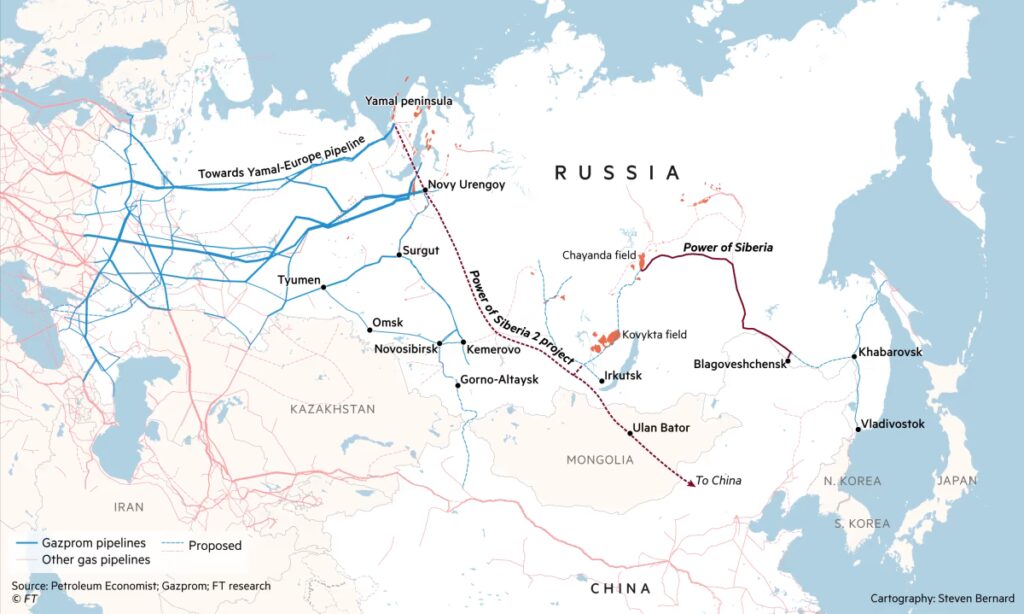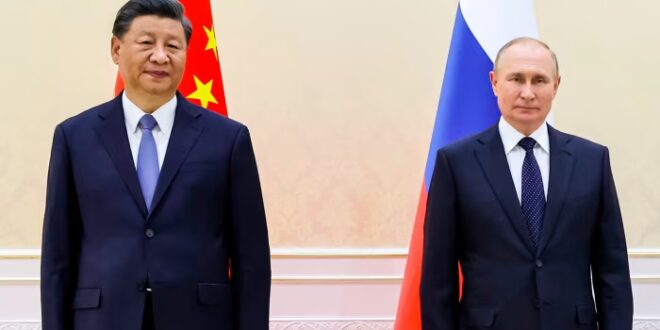Power of Siberia 2 project would offer lifeline to exporter Gazprom as Moscow’s dependence on its neighbour grows
Russia’s attempts to conclude a major gas pipeline deal with China have run aground over what Moscow sees as Beijing’s unreasonable demands on price and supply levels, according to three people familiar with the matter.
Beijing’s tough stance on the Power of Siberia 2 pipeline underscores how Russia’s invasion of Ukraine has left President Vladimir Putin increasingly dependent on Chinese leader Xi Jinping for economic support.
The people familiar with the matter said China had asked to pay close to Russia’s heavily subsidised domestic prices and would only commit to buying a small fraction of the pipeline’s planned annual capacity of 50bn cubic metres of gas.
Approval for the pipeline would transform the dire fortunes of Gazprom, Russia’s state gas export monopoly, by linking the Chinese market to gasfields in western Russia that once supplied Europe.
Gazprom suffered a loss of Rbs629bn ($6.9bn) last year, its biggest in at least a quarter of a century, amid plummeting gas sales to Europe, which has had greater success than expected in diversifying away from Russian energy.
While Russia has insisted it is confident of agreement on Power of Siberia 2 “in the near future”, two of the people said the impasse was the reason Alexei Miller, Gazprom’s chief executive, had not joined Putin on the Russian leader’s state visit to Beijing last month.
Miller, who was instead on a trip to Iran, would have been essential for any serious negotiations with China and his absence was “highly symbolic”, said Tatiana Mitrova, a research fellow at Columbia University’s Center on Global Energy Policy.

A deal on the pipeline was one of three main requests Putin made to Xi when they met, according to the people familiar with the matter, along with more Chinese bank activity in Russia and for China to snub a peace conference being organised by Ukraine this month.
China announced on Friday it would skip Ukraine’s summit in Geneva. Two of the people said Beijing and Moscow were discussing ringfencing one or more banks that would finance trade in components for Russia’s defence industry — all but certainly incurring US sanctions that would cut any such bank out of the broader global financial system.
An agreement on the pipeline, however, remains distant, while the proposed co-operation with Chinese banks remains at a far smaller scale than Russia had requested, the people added.
The Kremlin did not immediately respond to a request for comment. Gazprom declined to comment.
Russia’s failure to secure the deal underscores how the war in Ukraine has made China the senior partner in the countries’ relationship, according to Alexander Gabuev, director of the Carnegie Russia Eurasia Center in Berlin.
“China could need Russian gas strategically as a secure source of supply not based on maritime routes that would be affected in case of a maritime conflict around Taiwan or the South China Sea,” Gabuev said. “But to make that worthwhile, China really needs a very cheap price and flexible obligations.”
China’s demand for imported gas is expected to reach about 250 bcm by 2030, up from less than 170 bcm in 2023, according to a paper published by Columbia’s CGEP in May.
That paper said the 2030 level of demand could still be largely or entirely met through existing contracts for pipeline supply and for liquefied natural gas. However, by 2040, the gap between China’s import demand and existing commitments would reach 150 bcm, it said.
Russia’s lack of an alternative overland route for its gas exports means Gazprom would probably have to accept China’s conditions, Gabuev said.
“China believes time’s on its side. It has room to wait to squeeze the best conditions out of the Russians and wait for attention on the China-Russia relationship to move elsewhere,” he said. “The pipeline can be built rather quickly, since the gasfields are already developed. Ultimately the Russians don’t have any other option to market this gas.”
Before the war in Ukraine, Gazprom relied on selling gas to Europe at high prices in order to subsidise Russia’s domestic market.
China already pays Russia less for gas than to its other suppliers, with an average price of $4.4 per million British thermal units, compared with $10 for Myanmar and $5 for Uzbekistan, the CGEP researchers calculated from 2019-21 customs data.
During the same years Russia exported gas to Europe at about $10 per million Btu, according to data published by the Russian central bank.
Gazprom’s exports to Europe fell to 22 bcm in 2023 from an average 230 bcm a year in the decade before the full-scale invasion of Ukraine. These are likely to dwindle further once a trans-shipment agreement with Ukraine expires at the end of this year.
Failure to agree increased supplies to China would be a hefty further blow. An unreleased report by a major Russian bank, seen by the FT, recently excluded Power of Siberia 2 from its baseline forecast for Gazprom. That reduced the company’s expected profit for 2029 — when the bank expected the project to launch — by almost 15 per cent.
China did not immediately respond to a request for comment.
 Eurasia Press & News
Eurasia Press & News




